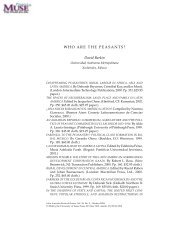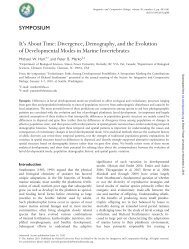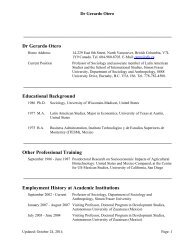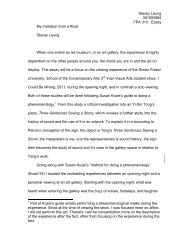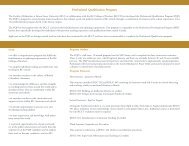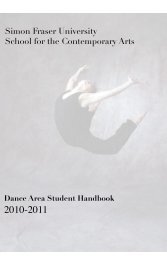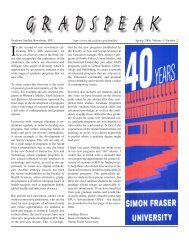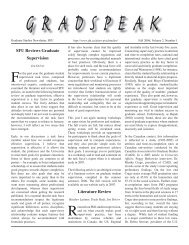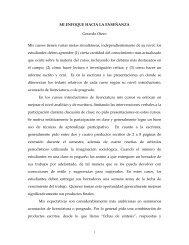Review of Mexico in Transition by Byron Crites
Review of Mexico in Transition by Byron Crites
Review of Mexico in Transition by Byron Crites
- TAGS
- transition
- byron
- crites
- cgi.sfu.ca
You also want an ePaper? Increase the reach of your titles
YUMPU automatically turns print PDFs into web optimized ePapers that Google loves.
Book <strong>Review</strong>s<br />
partly expla<strong>in</strong>ed its opposition to popular carnival). Here, his decision to focus on the<br />
writers Adrián del Valle and Antonio Penichet is commendable and useful, although<br />
it must be said that the repeated use <strong>of</strong> their literary works at the end <strong>of</strong> some earlier<br />
chapters, to illustrate attitudes (to race, nationalism and so on) does not work especially<br />
well; mostly, these sections are too short to come across as anyth<strong>in</strong>g other than<br />
fasc<strong>in</strong>at<strong>in</strong>g afterthoughts.<br />
Indeed, one criticism <strong>of</strong> the whole book might be that Shaffer perhaps tries to say<br />
too many th<strong>in</strong>gs, with some chapters as a result be<strong>in</strong>g frustrat<strong>in</strong>gly short; one cannot<br />
help feel<strong>in</strong>g that a greater impact might have come from a narrower focus, either on<br />
the political impetus or the counter-culture. However, whatever the m<strong>in</strong>or faults, the<br />
overall effect <strong>of</strong> the book is <strong>of</strong> a challenge that is well susta<strong>in</strong>ed and argued and one<br />
which stresses the genu<strong>in</strong>ely radical critique (rather than action) which Cuban anarchism<br />
<strong>of</strong>fered.<br />
Antoni Kapcia<br />
University <strong>of</strong> Nott<strong>in</strong>gham<br />
Haney, Patrick J. and Vanderbush, Walt (2005) The Cuban Embargo: The Domestic<br />
Politics <strong>of</strong> an American Foreign Policy , University <strong>of</strong> Pittsburgh Press (Pittsburgh),<br />
xi + 222 pp. $24.95 pbk.<br />
As the title <strong>of</strong> this book <strong>in</strong>dicates, this is a detailed analysis <strong>of</strong> the US governmental<br />
processes that have produced the economic embargo on Fidel Castro, and not so much<br />
<strong>of</strong> the USA embargo policy itself. The authors give us pass<strong>in</strong>g h<strong>in</strong>ts that they disapprove<br />
<strong>of</strong> the embargo and regard it as a failure, but they mostly <strong>of</strong>fer a very evenhanded<br />
discussion <strong>of</strong> the policy and its impact. Unlike many critics who regard the<br />
policy as a clear and obvious mistake, they do not portray the process that produced<br />
it as pathological or as the simple result <strong>of</strong> an overly-<strong>in</strong>fl uential community <strong>of</strong> anti-<br />
Castro Cuban émigrés who have clustered <strong>in</strong> Miami.<br />
The book <strong>in</strong>stead shows how a very complicated <strong>in</strong>teraction <strong>of</strong> domestic <strong>in</strong>terests<br />
and political personalities, chang<strong>in</strong>g over time, has produced the embargo policies and<br />
how such policies themselves have been uneven. While one can see a certa<strong>in</strong> broad<br />
cont<strong>in</strong>uity, <strong>of</strong> course, <strong>in</strong> the embargo that has lasted from Eisenhower all the way to<br />
the second Bush adm<strong>in</strong>istration, the authors also note how the embargo has been<br />
chang<strong>in</strong>g <strong>in</strong> form over time and show how the process has seen power shift from the<br />
President to the Congress, and to various private-sector groups (not just the Cuban-US<br />
lob<strong>by</strong>) over these fi ve decades. The role <strong>of</strong> the Cuban-US community and <strong>in</strong> particular<br />
<strong>of</strong> the Cuban US National Foundation (CANF), is discussed <strong>in</strong> some detail, and avoids<br />
trad<strong>in</strong>g caricatures <strong>of</strong> this lob<strong>by</strong>.<br />
The book is very well written, and exhaustively researched, draw<strong>in</strong>g <strong>in</strong> analogies<br />
with the role <strong>of</strong> Congress and private groups, on such other ethnically-charged foreign<br />
policy issues as US attitudes on Taiwan or Israel. It is thus valuable read<strong>in</strong>g for anyone<br />
specialis<strong>in</strong>g <strong>in</strong> US foreign policy and the evolv<strong>in</strong>g relationship between Congress and<br />
© 2007 The Authors. Journal compilation © 2007 Society for Lat<strong>in</strong> American Studies<br />
132 Bullet<strong>in</strong> <strong>of</strong> Lat<strong>in</strong> American Research Vol. 26, No. 1



